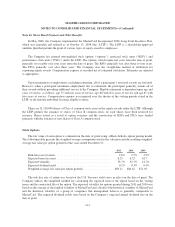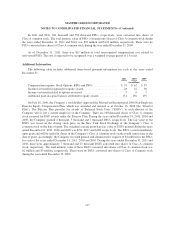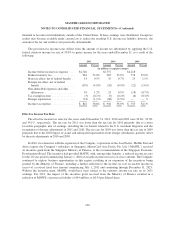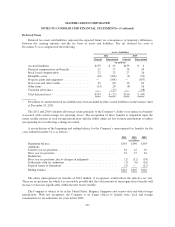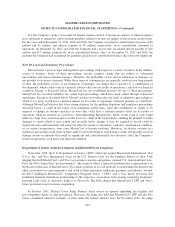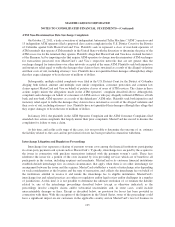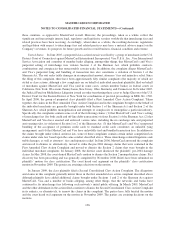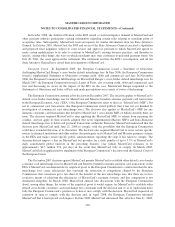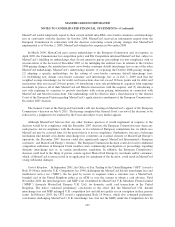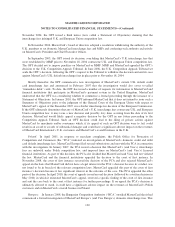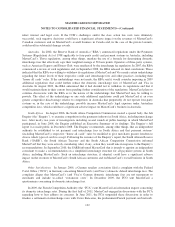MasterCard 2011 Annual Report Download - page 127
Download and view the complete annual report
Please find page 127 of the 2011 MasterCard annual report below. You can navigate through the pages in the report by either clicking on the pages listed below, or by using the keyword search tool below to find specific information within the annual report.MASTERCARD INCORPORATED
NOTES TO CONSOLIDATED FINANCIAL STATEMENTS—(Continued)
issued a final judgment that ordered MasterCard to repeal the CPP insofar as it applies to issuers and enjoined
MasterCard from enacting or enforcing any bylaw, rule, policy or practice that prohibits its issuers from issuing
general purpose credit or debit cards in the United States on any other general purpose card network. The Second
Circuit upheld the final judgment and the Supreme Court denied certiorari.
Shortly after the Supreme Court’s denial of certiorari, both American Express and Discover Financial
Services, Inc. filed complaints against MasterCard and Visa in which they alleged that the implementation and
enforcement of MasterCard’s CPP and Visa’s bylaw provision violated U.S. federal antitrust laws. In June 2008,
MasterCard entered into a settlement agreement with American Express to resolve all current litigation between
American Express and MasterCard. Under the terms of the settlement agreement, MasterCard was obligated to
make twelve quarterly payments of up to $150 million per quarter with the first payment having been made in
September 2008 and the final payment having been made during the second quarter of 2011. See Note 18
(Obligations under Litigation Settlements) for additional discussion. In October 2008, MasterCard and Visa
entered into a settlement agreement with Discover (the “Discover Settlement”), ending all litigation between the
parties for a total of approximately $2.8 billion. The MasterCard share of the settlement, paid to Discover in
November 2008, was approximately $863 million. In addition, in connection with the Discover Settlement and
pursuant to a separate agreement, Morgan Stanley, Discover’s former parent company, paid MasterCard $35
million in November 2008.
In April 2005, a complaint was filed in California state court on behalf of a putative class of consumers
under California unfair competition law (Section 17200) and the Cartwright Act (the “Attridge action”). The
claims in this action seek to piggyback on the portion of the DOJ antitrust litigation discussed above with regard
to the District Court’s findings concerning MasterCard’s CPP and Visa’s related bylaw. MasterCard and Visa
moved to dismiss the complaint and the Court granted the defendants’ motion to dismiss the plaintiffs’
Cartwright Act claims but denied the defendants’ motion to dismiss the plaintiffs’ Section 17200 unfair
competition claims. MasterCard filed an answer to the complaint in June 2006 and the parties have proceeded
with discovery. In September 2009, MasterCard executed a settlement agreement that is subject to court approval
in the California consumer litigations (see “-U.S. Merchant and Consumer Litigations”). The agreement includes
a release that the parties believe encompasses the claims asserted in the Attridge action. In August 2010, the
Court in the California consumer actions executed an order granting final approval to the settlement. The plaintiff
from the Attridge action and three other objectors filed appeals of the settlement approval order. In January 2012,
the Appellate Court reversed the trial court’s settlement approval and remanded the matter to the trial court for
further proceedings. At this time, it is not possible to determine the outcome of, or estimate the liability related
to, the Attridge action and no incremental provision for losses has been provided in connection with it.
Currency Conversion Litigations
MasterCard International, together with Visa U.S.A., Inc. and Visa International Corp., are defendants in a
state court lawsuit in California. The lawsuit alleges that MasterCard and Visa wrongfully imposed an asserted
one percent currency conversion “fee” on every credit card transaction by U.S. MasterCard and Visa cardholders
involving the purchase of goods or services in a foreign country, and that such alleged “fee” is unlawful. This
action, titled Schwartz v. Visa Int’l Corp., et al. (the “Schwartz action”), was brought in the Superior Court of
California in February 2000, purportedly on behalf of the general public. MasterCard International, Visa U.S.A.,
Inc., Visa International Corp., several member banks including Citibank (South Dakota), N.A., Chase Manhattan
Bank USA, N.A., Bank of America, N.A. (USA), MBNA, and Citicorp Diners Club Inc. are also defendants in a
number of federal putative class actions that allege, among other things, violations of federal antitrust laws based
on the asserted one percent currency conversion “fee.” Pursuant to an order of the Judicial Panel on Multidistrict
Litigation, the federal complaints have been consolidated in MDL No. 1409 (the “MDL action”) before Judge
William H. Pauley III in the U.S. District Court for the Southern District of New York.
123



